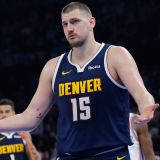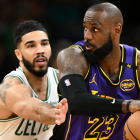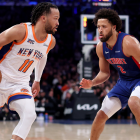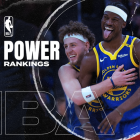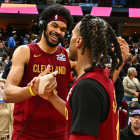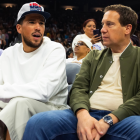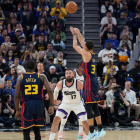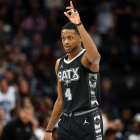Wizards All-Star guard Bradley Beal has agreed to a contract extension for two years on a $72 million maximum deal, agent Mark Bartelstein of Priority Sports told ESPN's Adrian Wojnarowski on Thursday. The deal includes a player option for the 2022-23 season and the total value could go up to four years and nearly $130 million.
As part of the extension, Beal has a 15 percent trade kicker and becomes ineligible to be traded this season.
Here's more from his agent:
"This was a long process that really covered the entire summer and fall, including numerous conversations and meetings among Ted, Tommy, myself and Brad," Bartelstein told ESPN. "This was probably going to be the most important decision that Brad was going to make in his career and we wanted to give Ted and Tommy every opportunity to present their vision for the franchise. And they've genuinely done a wonderful job of getting Brad excited about the future and how they plan to build the Wizards team around him.
Beal was drafted with the third overall pick in the 2012 NBA Draft out of the University of Florida and has reached the playoffs four times in his first seven seasons in the league. He's made back-to-back trips to the All-Star Game and has carried the load for the Wizards with John Wall sidelined with a ruptured Achilles. Last season he posted career highs in points (25.6), rebounds (5.5), assists (5.0) and (1.5) steals.
His new deal is one of the more interesting in recent league history. Here is everything you need to know about Beal's new contract.
1. This is not the 'supermax'
As amazing as this sounds given the $36 million average annual value of this contract, Beal technically could have been leaving some money on the table. This deal represents a typical maximum salary for a seven-to-nine year veteran: it starts at 30 percent of the salary cap. Had Beal waited a year and made an All-NBA Team, however, he could have made himself eligible for a Designated Veteran "supermax" deal starting at 35 percent of the cap.
On a depleted Wizards team, Beal will have a chance to post All-NBA numbers, but waiting a year carries its own risk. Beal could have theoretically lost this offer through either injury or declining play, or he could have scared the Wizards into trading him before he was ready. This deal was a compromise. Beal gets the extra guaranteed time under contract even if he gives up the chance to earn even more money by waiting.
2. Much ado about nothing?
Structurally speaking, this deal is eerily similar to the extension signed by Russell Westbrook in 2016. After losing Kevin Durant to free agency, getting Westbrook, who was only under contract for one more season, to sign any sort of extension was hugely important for the morale of the team and fan base. The deal was advertised as a three-year extension, as the maximum value of the deal was three years and $85.7 million.
In actuality, however, it was really only a one-year extension. Westbrook was already under contract for the 2016-17 campaign. The extension guaranteed he'd stay with Oklahoma City for the 2017-18 season, but he'd have a player option after that. If he'd wanted to leave the Thunder, he could have done so only one year later than he originally would have. By signing his extension, he guaranteed himself a huge chunk of change for a relatively minor commitment.
Beal is in the same boat. The Wizards will tout this as a major organizational victory, but in truth, Beal only committed himself to Washington for one extra season. He can still become an unrestricted free agent at the age of 29. If he ever did want to leave the Wizards, he could still force a trade relatively easily.
Of course, Westbrook is the model that Washington will hope to emulate here. The initial deal was a short one, but a year later, after acquiring Paul George, Oklahoma City was able to convince Westbrook to sign a truer extension that tied him to the organization for the rest of his prime and beyond. If Washington can do the same, they'll either have locked in their franchise player, or, like Oklahoma City, given themselves a valuable trade asset down the line.
3. Beal could be a very wealthy man
Financially speaking, the real coup for Beal is coming after this contract ... provided he remains healthy and productive. When Beal hits that player option for the 2022-23 season, he will have 10 years of NBA experience. That will make him eligible for a "supermax" deal regardless of his All-NBA status, and against a higher salary cap, that deal will be even heftier than it is now.
Wojnarowski projects it to pay $266 million over five years, but it should be noted that such projections are largely speculative at this point. Most public salary cap forecasts go only two years out, so depending on the league's financial health in three years, Beal's next deal could be worth either slightly more or slightly less than that. The odds favor a slightly lower figure based on a still brewing controversy.
4. This current deal could be slightly cheaper than it seems
Max contracts are tied to a percentage of the salary cap. The salary cap is tied to league-wide basketball-related income. The exact percentage of that income that is guaranteed to players through the cap can fluctuate, but 50 percent is the simplest number. If revenue grows, players make just as much as the owners do. If it shrinks, they take the same hit.
The cap probably isn't going to shrink any time soon, but growth could very likely take a hit based on what is happening in China. Houston Rockets games will not be aired on Chinese broadcaster Tencent this season due to recent comments by general manager Daryl Morey, and a number of sponsors have left the league as a result. That is going to have financial ramifications that will impact the cap.
And since Beal's deal won't kick in for two years, and the cap for the 2021-22 season has not been set, a lowered cap would also lower the value of this deal. Granted, the drop would be relatively small. The league makes roughly $250 million per year through its Chinese broadcasting deal with Tencent, and even if it lost all of that, it would still represent only a decline of around $4 million in terms of the cap. But Beal is the first player to sign a major deal since Morey's comments, and he is therefore the first to potentially suffer their ramifications.
5. Don't rule out a trade down the line
Getting Beal signed now as opposed to one year down the line had absolutely enormous ramifications for the Wizards. Beal is a seven-year NBA veteran. A player needs to have eight years of experience, four of which having come with their current team, in order to be eligible for a no-trade clause. Beal, therefore, didn't get one here.
The Wizards have given every indication that they plan to keep and build around Beal. If things don't work out, though, they now have control over his future, and this extension makes him an even more valuable trade asset. If this season were to go badly, for instance, Washington could deal him virtually anywhere next summer. Few teams would be afraid of acquiring a player with two guaranteed seasons remaining on his contract.
This isn't something that Wizards fans should expect. It just can't be ruled out, either. It doesn't take much to push a modern superstar down the trade request path, and teams have historically been fairly callous in executing such deals if doing so is in their own self-interest. The Los Angeles Clippers traded Blake Griffin mere months into a five-year deal that included a heartfelt recruitment showing his jersey being retired. If trading Beal makes sense for the Wizards, they'll do it.
Beal did write a 15 percent trade kicker into his new deal, but that is hardly an obstacle. It just forces the Wizards to pay him a lump sum on his way out the door if a trade ever does come. Washington hopes that one will never need to, and that Beal is helping them win basketball games for the next decade. But realistically, the Wizards are years away from any form of contention. This is not going to end the trade rumors surrounding Beal, just quiet them for the time being.
![[object Object] Logo](https://sportshub.cbsistatic.com/i/2020/04/22/e9ceb731-8b3f-4c60-98fe-090ab66a2997/screen-shot-2020-04-22-at-11-04-56-am.png)






